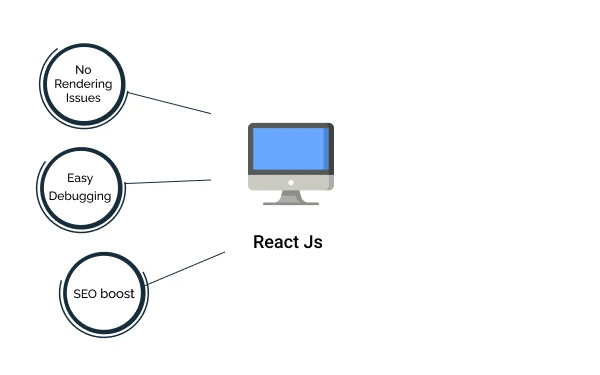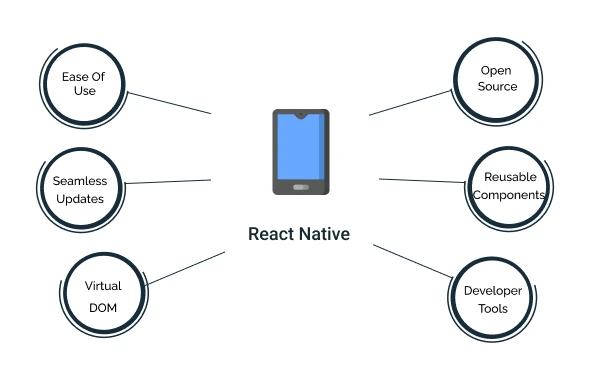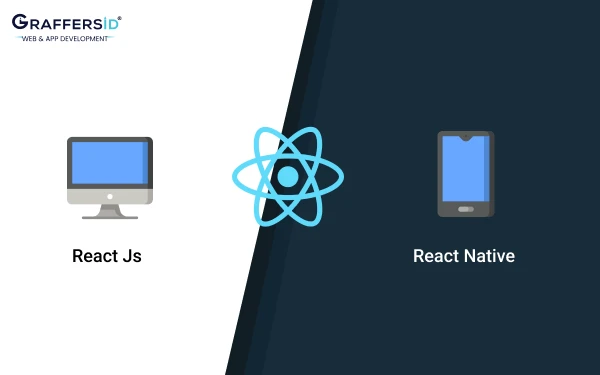ReactJS vs React Native – are the 2 implausibly widespread technologies within the app development business. These tools have similar names: they were launched by Facebook.
Since its launch, they have maintained its fan base. However, several within the system are still not clear concerning the variations between ReactJS vs React Native.
Of course, it is clear that one may be a web framework whereas the opposite may be a mobile framework. However, excluding that, are they different?
In this article, we will detailed view of the key differences between React vs React Native:
What is React?
React is a JavaScript library used for building user interfaces. This is often good, as a result, because it seems, this is often all we would like most of the time.
I believe the most effective half of this description is everything that it leaves out. It is not a mega framework.
It is not a full-stack answer that is about to handle everything from the info to period updates over net socket connections.
We do not truly need most of those pre-packaged solutions, as a result within the finish, they typically cause additional issues than they solve. Facebook Positive did hear what we would like.
Benefits of Using ReactJS

1. Faster development with reusable components:
One of the additional distinguished React blessings is its ability to recycle parts. With reusable codes, developers ought not to write very different codes for similar app parts. This facilitates quicker development with lower prices.
2. Concise Code:
We all grasp that writing codes is often a wearing method. It is not much possible either once it involves the repetition of bound functions and parts from the written code.
Mistreatment React will assure you that you just write clear and compact codes. Prompts an area unit created by React once any error is encountered.
3. No Rendering issues:
Did you recognize that React was associated with Facebook? Affirmative, that is correct. It was first utilized in the year 2013. Facebook said that it would be easier to render the code mistreatment React.
So now, however true is that? It is true indeed! Its virtual DOM structure ensures that the dynamic and seriously loaded software systems are often simply rendered in React.
4. Easy Debugging
With the assistance that is offered by React, debugging associate degree applications could be a straightforward method. The consistent prompts by React just in case an associate degree error is encountered will assist you to build an error-free application.
JS at the tip indicates JavaScript language being employed by React. Whether or not you utilize JS at the tip or not, the practicality of React remains similar.
5. SEO boost
React facilitates quicker rendering of the online pages. Due to this, the page loading time in the React app is somewhat low. As a result, websites built using React have a low bounce rate.
If you want to develop a React app, you can Hire ReactJS Developers on a contractual basis in India from GraffersID.
These factors have a big relation to the September performance of an internet application. Therefore, to conclude, React makes net apps SEO-friendly.
Moreover, developers will use tools like React Helmet and React Router to develop SEO-friendly websites simply.
Limitations of using React
1. Overhead prices & Time:
Typically, it becomes a necessity to transfer another react-enabled library that will increase price and time overheads.
2. Learning curve:
For a replacement developer, learning React could take far more time, compared to React Native. It means the training curve for React is additional, an associate degree will be difficult for brand-spanking new developers. The World Health Organization tried to make app victimization React.
3. External library support:
Though React supports several external, third-party libraries, their square measures only a few native libraries for React.
Now, external libraries will facilitate the developer to utilize each markup language and CSS functionalities and build it into JSX which has its complexities and steep learning curve.
4. Long information hierarchy:
Information navigation at React is difficult and complicated.
What is React Native
React Native initially started as an inside project at Facebook’s 2013 hackathon. The concept was to develop a React-based framework that may afford a lot of economic development of mobile apps on iOS and Golem.
Think of it this way: if you can build native-like mobile apps simply by sharing and reusing one JavaScript code, the total method of developing and maintaining your product would without a doubt become abundant and easier.
If you want to build a React Native App, you can hire React Native developers from GraffersID, a leading IT Staff Augmentation Company.
With that goal in mind, engineers from Facebook created a framework that could.
- Render native computer program elements on each mobile platform,
- Eliminate the necessity for writing and maintaining 2 separate codebases.
Benefits of React Native

1. React Native contains Native modules and parts that facilitate rendering code parts directly with Native genus APIs to enhance performance and speed.
It does not rely on WebView for code rendering, unlike different cross-platform frameworks.
Since, React Native additionally lets developers recycle code and a typical logic layer across iOS and Golem, the requirement for building the applications severally for each is avoided.
2. React Native offers all the mentioned advantages of React, like delivering an easy UI.
3. The component-based development model of the React Native framework creates AN agile internet-style approach for developers to make apps while not truly looking forward to any web.
4. React Native is simple to be told if you are acquainted with JavaScript.
5. A front-end developer might turn out to be a mobile developer if they apprehend enough concerning JavaScript and platform-specific genus, APIs, native UI components, or different style necessities.
6. No, you have to be compelled to overhaul your recent app. All you have got to try is to add React Native UI elements to your existing app’s code, while not having to rewrite it.
7. Native app development sometimes suggests unskillfulness, slower time to preparation, and less developer productivity.
8. React Native is all about conveyance, high speed, responsiveness, and nimbleness of net app development alongside effective process and best user expertise to the hybrid house, to produce your users with native app expertise.
9. You don’t have to be compelled to build an identical application for iOS and automaton, individually as React Native permits your developers to apply the common logic layer.
Know the key differences between NextJS and React
Limitations of React Native
We have mentioned why React Native could be an in-style alternative for the developer thanks to its blessings. However, while not obtaining prejudice, we tend to conjointly have to check up on the opposite facet of the coin. Yes, currently let us concentrate on a number of its major cons:
1. Managing the Memory
React Native is not an acceptable use for the computation of intensive apps and over again, the responsibility for this downside falls on JavaScript.
2. React Native continues to be New and Immature
React Native is a novice as compared to the alternative golem and iOS programming languages. It is still in its improvement stage and this could have a negative impact on the apps.
3. It Lacks the safety lustiness
We know that React Native could be a JavaScript library and ASCII text file framework that creates a spot within the security lustiness. However, occasionally, you would like to supply further security specifically if you are making banking and monetary apps wherever knowledge is extremely confidential.
4. Takes longer to Initialize
The problem with React Native is that it takes tons of your time to initialize the runtime even for advanced gadgets and devices before they are often rendered at the start.
5. Learning the Rope could be a robust raise
React Native is often a tricky rope to find out particularly if you are simply an underclassman within the app development field.
If you want to hire expert remote developers, consult GraffersID, a leading IT staff augmentation company.
This can be thanks to the presence of JSX within the JavaScript syntax extension wherever the hypertext markup language component gets combined with JavaScript.
Know How to develop web apps using ReactJS
Differences Between ReactJS vs. React Native
Here’s a detailed comparison table between ReactJS and React Native:
| Aspect | ReactJS | React Native |
|---|---|---|
| Platform | Web applications | Mobile applications (iOS, Android) |
| Language | JavaScript | JavaScript |
| UI Components | HTML elements and React components | Native components (e.g., View, Text, Image) |
| Rendering | Virtual DOM | Native rendering components |
| Development | Browser-based | Development environment (IDE) with simulators |
| Performance | Slightly slower than native | Native-like performance |
| Access to APIs | Web APIs | Native APIs through JavaScript bridges |
| Code Reusability | Limited (components can be reused) | High (most of the code can be reused) |
| Native Features | Not available | Access to native device features and modules |
| UI Design | Web-based styling (CSS, etc.) | Flexbox and CSS for styling |
| Third-Party Plugins | Browser-based | Native modules and third-party libraries |
| Community | Large and active | Active and growing |
| Learning Curve | Moderate (HTML, JSX, component model) | Moderate (React knowledge + mobile concepts) |
| Development Time | Shorter | Shorter due to code reusability |
| Debugging | Browser DevTools | Emulator/Simulator debugging |
| Maintenance | Easier due to a unified codebase | Easier due to shared codebase and updates |
| Popularity | Very popular | Very popular |
| Ecosystem | Rich ecosystem of libraries and tools | Growing ecosystem specific to mobile |
Summary:
- ReactJS is primarily for building web applications. It uses a virtual DOM for efficient updates and offers a wide range of UI components. It’s a good choice for web development with a rich ecosystem.
- React Native is designed for building mobile applications. It allows developers to create mobile apps using JavaScript and provides access to native device features. It offers excellent code reusability and performance close to native apps.
In choosing between ReactJS and React Native, consider the platform you intend to develop for (web or mobile), the nature of your project, the need for native features, and your team’s familiarity with the respective technology.
1. Connectivity
ReactJS and React Native square measure virtually identical in each manner. React Native is constructed on React.js. Hence, developers will notice a lot of React in React Native.
2. History of generation
React Native, on the other hand, could be a JavaScript programming language used for cross-platform mobile application development. It was additionally developed and launched by the Facebook team in 2015, is currently trending, and is the most well-liked development framework among app developers.
The life cycle of ReactJS and React Native square measure identical. Life cycle strategies are measured as follows:
- Initialization is the part where the developer must outline the initial states and props of the React element. This can usually drain the constructors.
- React.js library could be a JavaScript library that brought along a replacement method of rendering pages at the speed of JavaScript that successively resulted in responsive and dynamic user input.
- Both React.js and React Native are revived for common state management. Revived could be a standalone library that may be used with any UI application. The official React binding library-accustomed mix of React or React Native with reactivation is “React Redux”. React revived helps React parts browse knowledge from a revived store, and dispatch actions to the shop to update knowledge.
- React Native gets all the benefits of React.js. Both React JS and React Native follow the component-based design. Each of them uses identical React parts.
Which one offers better performance: ReactJS vs React Native?
ReactJS, often referred to as React, is designed for creating dynamic web applications with reusable UI components. On the other hand, React Native extends React’s capabilities to mobile app development, allowing developers to build native mobile apps using JavaScript.
Performance Comparison
Rendering and User Interface
ReactJS excels in building interactive and responsive web interfaces. It efficiently updates and renders only the necessary components when data changes, thanks to its Virtual DOM technology. This minimizes performance bottlenecks and enhances the overall user experience.
React Native, while also utilizing the Virtual DOM, focuses on rendering native components for mobile platforms. This approach ensures a smoother user experience by leveraging the device’s native capabilities.
Speed and Responsiveness
ReactJS offers impressive speed in web applications, but it might face performance challenges when dealing with complex mobile app scenarios. On the other hand, React Native provides better performance for mobile apps due to its native rendering, resulting in faster load times and smoother animations.
Native Functionality
When it comes to accessing native device features, React Native holds the advantage. It allows developers to integrate device-specific functionalities seamlessly, providing a more authentic mobile experience. ReactJS, being web-focused, lacks this capability.
User Experience and Interface
Web vs. Mobile Experience
ReactJS is tailored for web applications, offering a top-notch web browsing experience. It ensures responsive design and compatibility across various browsers. React Native, however, is unbeatable in delivering a genuine native feel on mobile devices, resulting in a superior user experience.
UI Components and Consistency
ReactJS maintains consistency in UI components across different browsers. In contrast, React Native maintains consistency in UI components across various platforms, ensuring that the app looks and feels the same on different devices.
Development Speed and Efficiency
Code Reusability
ReactJS enables code reusability to an extent by allowing components to be reused across the application. React Native takes this a step further, allowing developers to share a significant portion of code between different platforms, thereby accelerating development.
Hot Reloading Capabilities
Both ReactJS vs React Native support hot reloading, allowing developers to see real-time code changes without losing the current state of the application. This feature significantly speeds up the development and debugging process.
Popularity and Community Support
ReactJS Community
ReactJS boasts a massive and active community of developers, offering extensive resources, libraries, and solutions. This community support ensures that developers can easily find solutions to their problems.
React Native Community
The React Native community is also robust and growing rapidly. With the increasing demand for mobile apps, developers can rely on the community for guidance, plugins, and tools.
SEO Optimization
Impact on Search Engine Rankings
ReactJS applications are known for their SEO-friendliness, as search engines can index content rendered on the server side. This enhances the visibility of web applications in search engine results.
Server-Side Rendering (SSR) in ReactJS
Server-side rendering (SSR) is a technique employed by ReactJS to improve performance and SEO. It ensures that the initial page load contains pre-rendered content, which is favorable for search engine crawlers.
Can You hire the same developers for both ReactJS and React Native projects?
Hiring developers who are well-versed in both ReactJS vs React Native can offer certain advantages. These versatile developers possess a deep understanding of the core concepts shared by both frameworks. They can seamlessly transition between web and mobile app development, ensuring consistent design patterns and user experiences.
When you hire such developers, you can potentially save time and effort by having a unified team that can work on various aspects of your project. This versatility also extends to troubleshooting and maintenance, as the same team can address issues across different platforms.
Factors to Consider Before Hiring
Before making a decision, it’s essential to consider several factors:
- Project Complexity: For simpler projects with basic features, versatile developers might suffice. However, complex projects with intricate functionalities may require specialized skills.
- Timeline: If you’re working with tight deadlines, versatile developers can expedite the process by seamlessly switching between platforms.
- Budget: Hiring specialized developers might be costlier, but the investment can be justified by the superior quality of work.
- Long-Term Goals: Consider whether you plan to expand your app to multiple platforms in the future. If so, platform-specific specialists could be a strategic choice.
Conclusion
After looking at each nook and corner of the frameworks very well, an issue should be hanging in your mind, React or React Native is better.
One should initially perceive the fact that each ReactJS vs React Native square measures important focal points for each net and app development.
Moreover, because of their versatile functionalities, each platform’s square measures gain momentum with every passing day. Each framework or technology has its set of merits and shortcomings.
FAQs
Is React Native slower than ReactJS?
While React Native may experience some performance overhead due to native rendering, it offers better mobile app performance compared to ReactJS in complex scenarios. ReactJS, however, is better suited for web applications.
Can I reuse code between ReactJS vs React Native projects?
Yes, you can reuse code to a significant extent. React Native allows for greater code sharing between platforms, enabling developers to write code once and use it on both web and mobile projects.
Which one is better for SEO: ReactJS or React Native?
ReactJS holds an advantage in terms of SEO due to its server-side rendering (SSR) capabilities. SSR enhances page load speed and ensures better search engine indexing, ultimately improving SEO.
Can a ReactJS developer easily transition to React Native?
Yes, a ReactJS developer can transition to React Native with relative ease. The foundational concepts are the same, but React Native introduces mobile-specific components and considerations that developers need to learn.
Are there cost advantages to hiring the same developer for both projects?
Indeed, hiring one developer for both ReactJS and React Native projects can be more cost-effective than hiring specialists for each. However, cost should be weighed against the quality and expertise required for your project.




